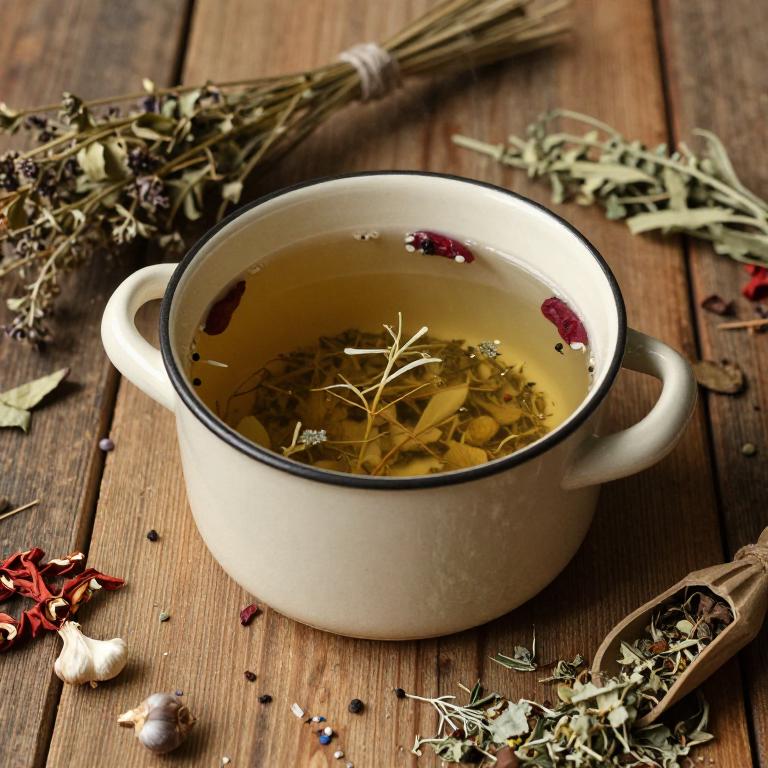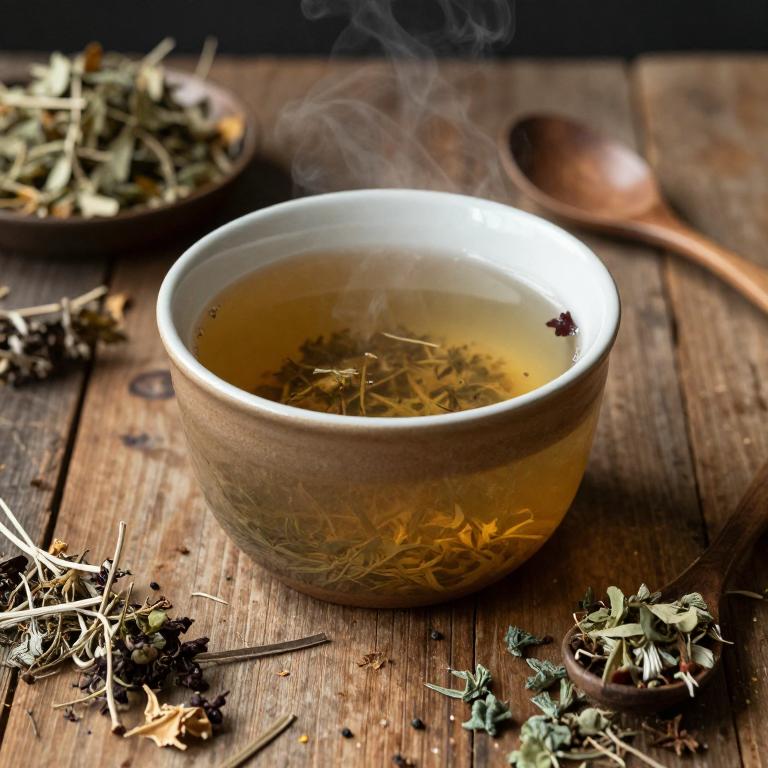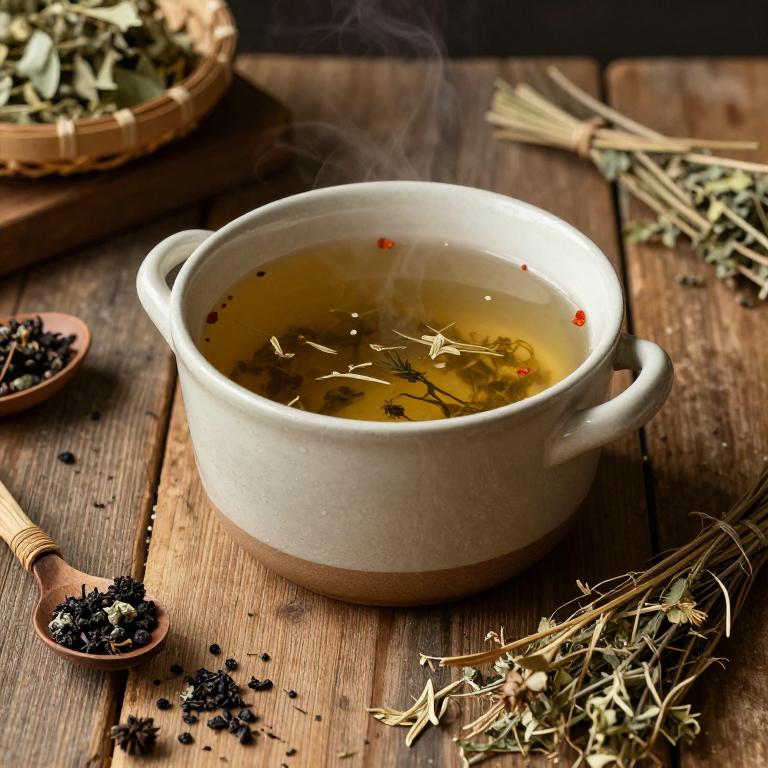10 Best Herbal Decoctions For Laryngitis

Herbal decoctions have been traditionally used to alleviate symptoms of laryngitis, which is inflammation of the larynx often caused by viral infections or overuse of the voice.
Common herbs such as licorice root, thyme, and eucalyptus are frequently included in these decoctions due to their anti-inflammatory and soothing properties. To prepare a decoction, these herbs are typically simmered in water for an extended period to extract their active compounds. Drinking the warm decoction can help reduce throat irritation and ease coughing, providing relief from the discomfort associated with laryngitis.
While herbal treatments may offer symptomatic relief, they should not replace medical advice, especially if symptoms persist or worsen.
Table of Contents
- 1. Ginger (Zingiber officinale)
- 2. Thyme (Thymus vulgaris)
- 3. Licorice (Glycyrrhiza glabra)
- 4. Chamomile (Matricaria chamomilla)
- 5. Stinging nettle (Urtica dioica)
- 6. Salvia (Salvia officinalis)
- 7. Echinacea (Echinacea purpurea)
- 8. Eucalyptus (Eucalyptus globulus)
- 9. Ceylon cinnamon (Cinnamomum verum)
- 10. Black elderberry (Sambucus nigra)
1. Ginger (Zingiber officinale)

Zingiber officinale, commonly known as ginger, has been traditionally used in herbal medicine for its anti-inflammatory and soothing properties.
Herbal decoctions made from fresh or dried ginger roots are often prepared by simmering the root in water to extract its active compounds, such as gingerol and shogaol. These decoctions are believed to help alleviate symptoms of laryngitis by reducing throat irritation and inflammation, while also promoting expectoration. The warming effect of ginger can help soothe a sore throat and ease coughing, making it a popular remedy in many cultures.
However, while ginger may offer some relief, it is advisable to consult a healthcare professional for persistent or severe laryngitis.
2. Thyme (Thymus vulgaris)

Thymus vulgaris, commonly known as thyme, is often used in herbal decoctions to treat laryngitis due to its antimicrobial and anti-inflammatory properties.
The leaves and flowers of thyme are typically dried and steeped in hot water to create a soothing herbal tea that can help reduce throat irritation and ease coughing. This decoction is believed to support the immune system and may help alleviate symptoms such as soreness and inflammation in the throat. It is often recommended as a natural remedy for mild cases of laryngitis, especially when combined with other herbal ingredients like licorice or eucalyptus.
However, it is important to consult a healthcare professional before using thyme decoctions, especially for prolonged or severe cases of laryngitis.
3. Licorice (Glycyrrhiza glabra)

Glycyrrhiza glabra, commonly known as licorice, has been traditionally used in herbal medicine for its soothing properties, particularly in treating laryngitis.
The herbal decoction of licorice root is prepared by boiling the dried root in water, creating a syrup-like preparation that can be consumed as a tea or added to other remedies. This decoction is valued for its anti-inflammatory and expectorant effects, which help reduce throat irritation and ease coughing associated with laryngitis. It also contains glycyrrhizin, a compound that may modulate the immune response and reduce swelling in the throat.
However, prolonged use of licorice decoctions should be avoided due to potential side effects such as hypertension and electrolyte imbalances.
4. Chamomile (Matricaria chamomilla)

Matricaria chamomilla, commonly known as chamomile, is often used in herbal decoctions to alleviate symptoms of laryngitis due to its anti-inflammatory and soothing properties.
When prepared as a tea, chamomile can help reduce throat irritation and ease coughing by calming the mucous membranes in the respiratory tract. The essential oils in chamomile, particularly bisabolol and chamazulene, contribute to its antimicrobial and antispasmodic effects, which may help combat infections and reduce inflammation. To prepare a decoction, dried chamomile flowers are steeped in hot water for several minutes, and the resulting tea can be consumed several times a day.
While generally safe, individuals with allergies to plants in the daisy family should exercise caution when using chamomile for laryngitis.
5. Stinging nettle (Urtica dioica)

Urtica dioica, commonly known as stinging nettle, has been traditionally used in herbal medicine for its anti-inflammatory and soothing properties.
A decoction made from the leaves and stems of Urtica dioica can be prepared by simmering the dried plant material in water for several minutes. This herbal preparation is often used to alleviate symptoms of laryngitis, such as sore throat and hoarseness, due to its high content of minerals and antioxidants. The decoction may help reduce inflammation in the throat and support the body's natural healing process.
However, it is advisable to consult a healthcare professional before using stinging nettle decoctions, especially for prolonged or severe cases of laryngitis.
6. Salvia (Salvia officinalis)

Salvia officinalis, commonly known as sage, has been traditionally used in herbal medicine for its soothing properties, particularly in the treatment of laryngitis.
Herbal decoctions made from sage leaves are often prepared by simmering the dried leaves in water to extract their active compounds, such as flavonoids and essential oils. These decoctions are believed to reduce inflammation and soothe irritated throat tissues, offering relief from hoarseness and coughing associated with laryngitis. The antimicrobial and antiseptic properties of sage may also help in preventing secondary infections.
While sage decoctions can be a natural remedy, it is important to consult a healthcare professional before use, especially for prolonged or severe cases of laryngitis.
7. Echinacea (Echinacea purpurea)

Echinacea purpurea, commonly known as purple coneflower, is a popular herbal remedy used for its immune-boosting properties.
Herbal decoctions made from Echinacea purpurea are often prepared by simmering the dried roots, leaves, or flowers in water to extract their active compounds. These decoctions are traditionally used to alleviate symptoms of laryngitis, such as sore throat and hoarseness, by reducing inflammation and enhancing the body's immune response. While some studies suggest that Echinacea may shorten the duration of colds, its efficacy for laryngitis specifically remains inconclusive.
As with any herbal remedy, it is advisable to consult a healthcare professional before use, especially for individuals with allergies or chronic health conditions.
8. Eucalyptus (Eucalyptus globulus)

Eucalyptus globulus, commonly known as the Tasmanian blue gum, is often used in herbal decoctions to alleviate symptoms of laryngitis.
The leaves of this plant contain compounds such as eucalyptol and flavonoids, which possess anti-inflammatory and antimicrobial properties. Preparing a decoction involves simmering the dried leaves in water for several minutes to extract these beneficial compounds. This herbal remedy is believed to help reduce throat irritation, ease coughing, and soothe inflamed tissues in the throat.
While it may offer symptomatic relief, it is advisable to consult a healthcare professional for persistent or severe cases of laryngitis.
9. Ceylon cinnamon (Cinnamomum verum)

Cinnamomum verum, commonly known as true cinnamon, has been traditionally used in herbal medicine for its potential therapeutic properties.
Herbal decoctions made from the bark of Cinnamomum verum are often prepared by simmering the dried bark in water for an extended period to extract its active compounds. These decoctions are believed to possess anti-inflammatory and antimicrobial effects, which may help alleviate symptoms of laryngitis such as sore throat and hoarseness. However, while some studies suggest possible benefits, more clinical research is needed to confirm its efficacy for treating laryngitis.
As with any herbal remedy, it is advisable to consult a healthcare professional before use, especially for individuals with known allergies or chronic health conditions.
10. Black elderberry (Sambucus nigra)

Sambucus nigra, commonly known as elderberry, has been traditionally used in herbal medicine for its potential anti-inflammatory and antiviral properties.
When prepared as a decoction, the berries and flowers of Sambucus nigra are simmered in water to extract their active compounds, which may support the immune system and reduce throat irritation. This herbal decoction is often recommended for its soothing effects on the respiratory tract, making it a popular remedy for laryngitis. However, it is important to note that while some studies suggest its benefits, more research is needed to confirm its efficacy and safety for treating laryngitis.
As with any herbal treatment, it should be used under the guidance of a qualified healthcare professional.